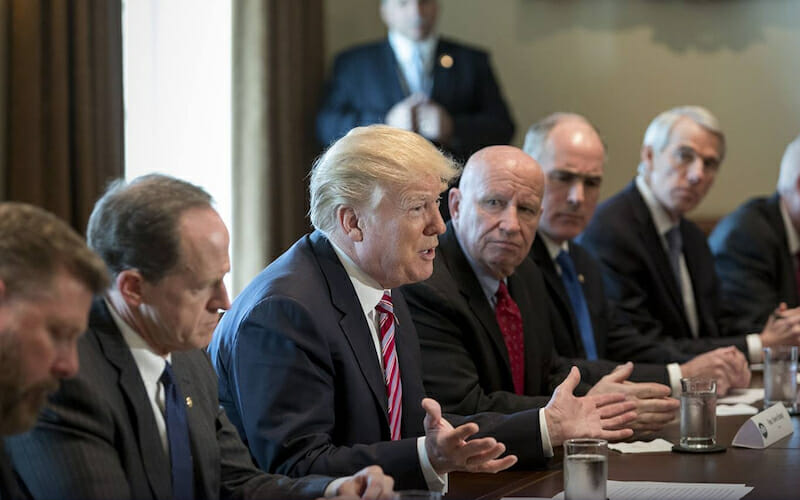
Political Tensions Mean Sanctions; Sanctions Mean Suffering
U.S. President Donald Trump’s warnings that his administration might de-certify the Joint Comprehensive Plan of Action, popularly known as the Iran Deal, portend a difficult future for the Iranian people and the Iran-U.S. relations.
The JCPOA is an international agreement, reached in Vienna on 14 July 2015, between Iran and the five permanent members of the UN Security Council plus Germany and the European Union and was endorsed by the United Nations Security Council Resolution 2231 six days later.
The Iran deal deters Iran from obtaining “nuclear weapons,” blocks all technical pathways the country might use to accumulate enough material to make a weapon and gives the international community the assurance that any activity definable under the country’s atomic energy programme remains peaceful. In turn, Iran enjoys a broad range of sanctions relief, reconnection to the global banking system, releasing of its frozen funds abroad and facilitated foreign direct investment.
The document runs 109 pages, including five annexes, and is the concrete outcome of almost a decade of negotiations between Iran and the international community, which began in 2006 and despite huge ups and downs, finally bore fruit in July 2015.
Iran’s diplomatic apparatus, under President Rouhani, took a sober decision to settle this longstanding conflict. They sat at the negotiation table with the P5+1 (five permanent members of the UN Security Council, namely China, France, the United Kingdom, Russia and the United States plus Germany), on different occasions, in different cities across the world, and found a way to end the nuclear impasse.
Iran’s subscription to the Treaty on the Non-Proliferation of Nuclear Weapons (NPT) obligates the country to stick to certain standards in pursuit of its nuclear activities. However, shortly after rising to power, former President Mahmoud Ahmadinejad blended his ideological ambitions with things of scientific and technical nature, went beyond the pale and produced what came to be known as Iran’s nuclear controversy, followed by a reprehensible foreign policy mess and an array of sanctions and embargoes that nearly smashed the country’s economy and energy sector.
The successful negotiation of the JCPOA meant that Iran could enjoy better relations with the outside world, a respectful and meaningful engagement with the International Atomic Energy Agency and a reconstruction of its economy. However, the UN atomic watchdog, through its verification procedures, should continue working with Iran to monitor its commitment to its JCPOA obligations and the different parties to the deal should continue honoring the agreement equally.
The former U.S. President Barack Obama had mentioned that JCPOA is built on verification, not trust, and this skepticism means it’s still a fragile agreement that any signatory can easily betray or violate by citing trust issues, which is itself partly because Iran is not yet a fully-integrated member of the international community. However, there is a humanitarian “if…then” to these uncertainties.
If the United States, which under President Trump, seems to be the most unwilling signatory of the JCPOA, is not happy to stick to its commitments, as manifested in his recent warnings that the United States may de-certify the deal unilaterally, then the international community should expect a new set of political tensions, because Iran will most probably respond aggressively or even irrationally. In this case, the existence and legitimacy of the deal itself might be compromised, and aside from the political tensions, humanitarian consequences for the ordinary Iranian citizens should be expected.
Those politicians and world leaders who boast of their concerns for the value of human life, global peace and protection of the civilian population should bear this clearly in mind that failing to uphold a simple, yet hardly-achieved agreement as the Iran nuclear deal means shredding the outcome of years of intense and breathtaking talks on a disagreement that logically and realistically didn’t need one decade to be settled.
Years of sanctions have left Iran with one of the world’s oldest, most unsafe air fleets. With every new tragedy, like the recent crashing of Aseman Airlines’ ATR72, in which sixty-six Iranians perished on a flight from the capital Tehran to the Western city of Yasouj, the country’s woes and difficulties come to new light, one being its enduring aviation hitches. The same airline, has 30 Boeing 737 MAX jets on order. The narrow-body aircraft is one of the newest products of Boeing Commercial Airplanes. As of January 2018, 80 units of it are already delivered and 4,307 units have been ordered.
However, as The Independent suggests, Aseman Airlines might never be able to take delivery of its orders, most probably because their export will be banned by President Trump.
And with every new aviation incident, Iranian authorities get together on TV programmes and other than to blame the climatic situations or defending the quality of the planes their predecessors had bought three decades ago, find no clear justification to provide, because otherwise, they’ll be confirming their mismanagement and the inability of the country’s airlines to improve their safety regulations. And in Iran, it’s very uncommon for the high-ranking officials to resign in the light of such tragedies, neither as an indication of admitting their shortcoming, nor as an expression of sympathy with the nation and the families of those who’ve lost their dear ones.
And the Iranian audience remains perplexed with lots of unanswered questions, one being, “is it so difficult to sit with the American authorities at the same table and find a solution once to spare more lives and prevent the recurrence of such traumas?”
Although the EU authorities, most importantly the High Representative of the European Union for Foreign Affairs and Security Policy Federica Mogherini have reiterated several times that the European Union and its different bodies remain loyal to the principles of the Joint Comprehensive Plan of Action, both to ensure the Union’s continued abidance by the goals of nuclear non-proliferation and engagement with the Iranian government and people, continued casting into doubt of the JCPOA by the U.S. President can have different implications.
One of the implications of any partisan action by President Trump is that economic sanctions and restrictions are still used as a leverage of coercion against a nation already struggling with problems such as an aging and suffering fleet and rendering any prospect of its improvement futile.
One of the other important implications is that there are still politicians who fail to act their age, and as a result, Iran-U.S. relations will be stuck in limbo for the foreseeable future.

